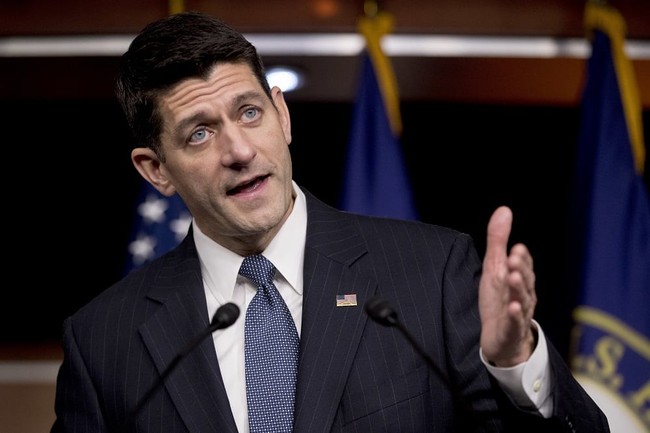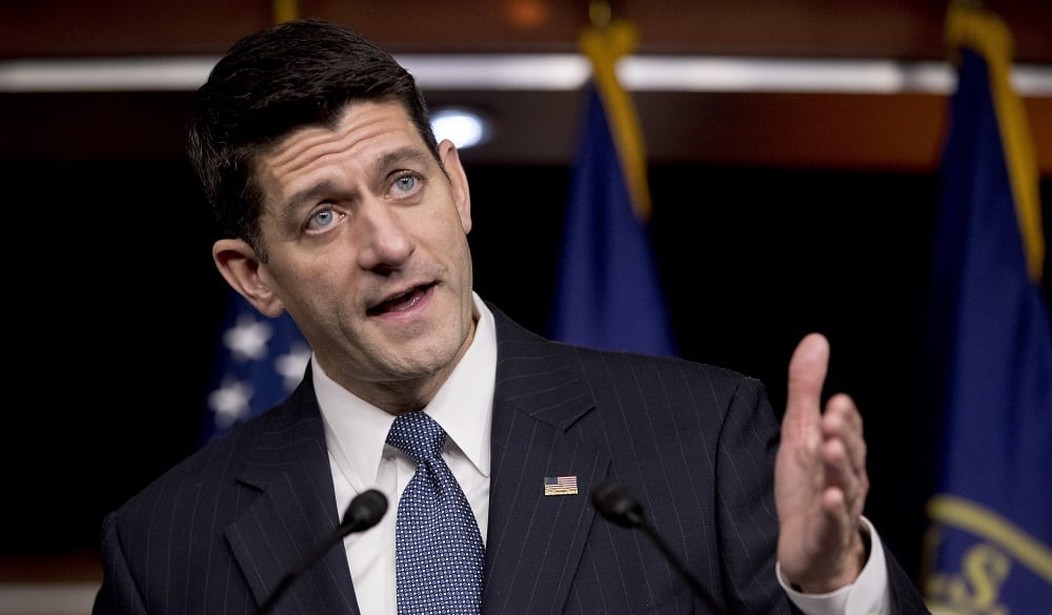
House Speaker Paul Ryan of Wis., speaks during his weekly press conference on Capitol Hill, Thursday, Oct. 26, 2017, in Washington. (AP Photo/Andrew Harnik)
One of the most bizarre aspects of the ongoing investigation of something or another by Robert Mueller is the FBI’s use of the Trump dossier and their own relationship with the author. How the FBI used the dossier, and whether they did so knowing how it was compiled or they did it in good faith, is a story for another day.
The hows and whys on the use of the dossier aside, at some point, and for reasons that remain very unclear, the FBI decided to enter into a business arrangement with the author, Christopher Steele, AFTER the election to produce yet more oppo on Donald Trump. There might be non-J.-Edgar-Hooverish reasons for them to do so but they escape me.
This is how the Washington Post reports the story from February 28, 2017: FBI once planned to pay former British spy who authored controversial Trump dossier.
The former British spy who authored a controversial dossier on behalf of Donald Trump’s political opponents alleging ties between Trump and Russia reached an agreement with the FBI a few weeks before the election for the bureau to pay him to continue his work, according to several people familiar with the arrangement.
The agreement to compensate former MI6 agent Christopher Steele came as U.S. intelligence agencies reached a consensus that the Russians had interfered in the presidential election by orchestrating hacks of Democratic Party email accounts.
While Trump has derided the dossier as “fake news” compiled by his political opponents, the FBI’s arrangement with Steele shows that the bureau considered him credible and found his information, while unproved, to be worthy of further investigation.
Ultimately, the FBI did not pay Steele. Communications between the bureau and the former spy were interrupted as Steele’s now-famous dossier became the subject of news stories, congressional inquiries and presidential denials, according to the people familiar with the arrangement, who spoke on the condition of anonymity because they were not authorized to discuss the matter.
One March 1, CNN reported that Steele had been reimbursed for expenses by the FBI:
The short-lived arrangement before the US election ended abruptly in part because of the frustration of Christopher Steele, the former MI6 spy, that the FBI wasn’t doing enough to investigate the Trump-Russia ties.
…
An official familiar with the discussions said the FBI didn’t hire Steele as an informant, but that the arrangement instead allowed for expenses to be paid. It couldn’t be learned how much he was paid and for how long.
Only part of this is true, because we now know that Steele was reimbursed for work done after November 8 and the Washington Post implies it was for actual work, not merely travel and lodging ans so on:
After the election, the FBI agreed to pay Steele to continue gathering intelligence about Trump and Russia, but the bureau pulled out of the arrangement after Steele was publicly identified in news reports.
As late as the end of June, the FBI was still refusing to either confirm or deny a financial arrangement with Steele.
Representative Devin Nunes, chairman of the House Intelligence Committee, asked the FBI for all their documents concerning their relationship with Steele. Crickets. He asked again and again. More cricket. Finally, on August 24, the Committee issued a subpoena to the FBI for the documents:
In the most significant escalation yet in the wrangling between Congress and the FBI over the Trump dossier, the House Intelligence Committee has subpoenaed the bureau and the Justice Department for documents relating to the dossier, the FBI’s relationship with dossier author Christopher Steele, and the bureau’s possible role in supporting what began as an opposition research project against candidate Donald Trump in the final months of last year’s presidential campaign.
The subpoenas are an indication of growing frustration inside the committee over the FBI and Justice Department’s lack of cooperation in the Trump-Russia investigation.
The committee issued the subpoenas — one to the FBI, an identical one to the Justice Department — on August 24, giving both until last Friday, September 1, to turn over the information.
Neither FBI nor Justice turned over the documents, and now the committee has given them an extension until September 14 to comply.
Illustrating the seriousness with which investigators view the situation, late Tuesday the committee issued two more subpoenas, specifically to FBI Director Christopher Wray and Attorney General Jeff Sessions, directing them to appear before the committee to explain why they have not provided the subpoenaed information.
The subpoenas are the result of a months-long process of committee investigators requesting information from the FBI and Justice Department. Beginning in May, the committee sent multiple letters to the FBI and Justice requesting information concerning the Trump-Russia affair.
Nunes threatened to hold Sessions and the acting FBI Director in contempt of Congress:
So Rep Nunes now threatening to hold AG Sessions & FBI Director in *contempt* if they don't turn over dossier docs.
Newly public letter: pic.twitter.com/gyKmM7NdvV
— Ari Melber (@AriMelber) September 6, 2017
The subpoena produced about as much respect as did the Committee asking nicely.
In an interview on Wednesday, Paul Ryan stepped into the fray:
“We’ve had these document requests with the administration, with the FBI in particular, for a long time and they’ve been stonewalling,” Ryan told Reuters in an interview, adding that the department and the FBI needs to comply with Congress’ documents requests “and they need to do it immediately.”
That nudge was enough.
Via the Wall Street Journal:
The Federal Bureau of Investigation is expected to hand over to Congress documents related to a controversial and unverified dossier on President Donald Trump by next week, ending a long-running impasse between lawmakers and federal law enforcement.
Speaking to reporters, House Speaker Paul Ryan said that the FBI had agreed to provide documents long sought by Congress in a variety of investigations under way, including information about a 35-page research document containing unverified allegations about Mr. Trump’s ties to Russia.
“The point of these investigations is to find the truth and to make sure if laws were violated or mistakes were made, they’re not made again. And transparency is what gets you that,” Mr. Ryan said. “The FBI got in touch with us yesterday afternoon. They have informed us that they will comply with our document requests and they will provide the documents that Congress has been asking for by next week. And we expect the FBI to honor that commitment,” Mr. Ryan said.
This is likely to be a significant event in the course of this melodrama.
FBI bombshells are also yet to come. The bureau has stonewalled congressional subpoenas for documents related to the dossier, but that became harder with the DNC-Clinton news. On Thursday Speaker Paul Ryan announced the FBI had finally pledged to turn over its dossier file next week.
Assuming the FBI is comprehensive in its disclosure, expect to learn that the dossier was indeed a major basis of investigating the Trump team—despite reading like “the National Enquirer,” as Rep. Trey Gowdy aptly put it. We may learn the FBI knew the dossier was a bought-and-paid-for product of Candidate Clinton, but used it anyway. Or that it didn’t know, which would be equally disturbing.
It might show the bureau was simply had. Don’t forget that it wasn’t until January the dossier became public, and the media started unearthing details. And the more ugly info that came out (Fusion, Democratic clients, intelligence-for-hire) the more former Obama officials seemed skeptical of it. In May, former Director of National Intelligence Jim Clapper said his people could never “corroborate” its “sourcing.” In June, Mr. Comey derided it as “salacious and unverified.”
Yet none of this jibes with reports that the FBI debated paying Mr. Steele to continue his work. Or that Mr. Comey was so convinced by the dossier that he pushed to have it included in the intelligence community’s January report on Russian meddling. Imagine if it turns out the FBI was duped by a politically contracted document that might have been filled up by the Kremlin.
Indeed, imagine that.













Join the conversation as a VIP Member